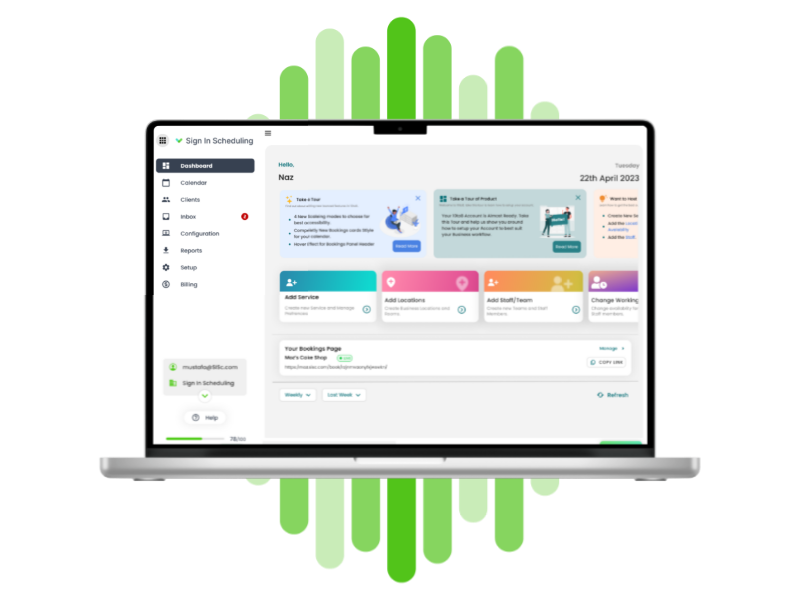What are some of the best ways of starting an online business? A question that many people ask...
12 Tips for Managing a Seasonal Business
10to8 works with appointment-based businesses, from piano tuners to osteopaths, music teachers to driving instructors. Businesses like these, that take bookings, can be greatly affected by seasonality and the resulting inconsistent income.
The best way to manage a seasonal business is by planning ahead. If you know what your busy season is going to be, then you can take the necessary steps such as hiring additional staff, expanding your inventory, setting realistic goals, and mitigating the risk of burnout during the busy times.
Small businesses know that seasonal fluctuations can seriously impact them and need to build resilience into their business model. We talked to our customers and researched various business experts to see how they cope with such significant changes.
Here are their top tips on how to run a seasonal business:
1. Research what’s expected in your industry
With any business, research is important. This holds true for seasonal businesses, too.
Before you start out, you should have some idea of expected income and have done research into seasonal fluctuations. Most businesses are affected by seasonality to an extent, whereas some need to entirely scale back operations like ski resorts, holiday rentals, lawn care services, or snow removal.
Look into what is expected in your industry and learn about any new trends. You could even talk to other businesses in your sector and ask them how they’ve been impacted. What level of fluctuation can you expect? How do they cope with it?
Once you have a better understanding of the market you’re working with, put together an action plan on how to handle each holiday or event.
2. Build what you’ve learned into your business model
Once you’ve done some research, it’s time to take action.
Build what you’ve learned into a solid business plan. You can work on how to overcome any challenges that may arise when planning ahead. If there are specific products or services that are especially in demand during a certain time of year, you need to focus on optimizing your supply chain and inventory levels for this time period.
No matter what type of business you run, it’s important that your team is prepared for the heavy workloads of peak seasons. If they aren’t ready – or aren’t aware of what’s coming – it can be extremely costly to your business.

For example, movie theatres don’t shut down in quiet seasons like some other seasonal businesses. However, they do hire extra employees for their busiest seasons and create budgets to reflect that increased income. Similarly, wedding planners, photographers, and caterers know they’ll thrive in the summer months, so they plan accordingly.
Use your cash flow projections to accurately assign money in the quiet months so you have a realistic sense of how much money you’ll have at the end of the year.
3. Maximize your downtime
Downtime is a crucial factor when considering how well you’ll be able to handle your business’s increased workload in peak seasons. You will need some downtime away from work in order to remain productive and healthy.
When it comes to how to run a seasonal business, making sure that you take enough vacation time or put aside days off can help you stay fresh and ready for work. This will also allow you to remain productive throughout busy periods without burning out.
For instance, many restaurants close for several weeks during their slowest months of the year (i.e. January and February) so that staff members can spend time with family or enjoy some well-deserved rest away from work.
Don’t completely close up shop during the slow season. Instead, take some time to reassess your business practices and ways of thinking. This way, you won’t become too reliant on peak periods for survival.
You can also catch up on other business tasks you can’t do when you’re busy, like general paperwork or planning your next newsletter. Schedule social media posts or draft an email campaign, so it’s all just ready to go when bookings pick up and you haven’t got the time.
4. Save at busy times
You may also need to save cash at busy times. Retail companies know that November and December are usually when they make the most profit (up to +15%) with holidays like Christmas, New Year’s, Thanksgiving, Hanukkah, etc. They’ll save substantial amounts of money to use in quieter months that follow, like January and February (-30% dip in sales).
If you’re not careful, you can end up using your cash reserves during the peak season – which is a risky move that could cause problems if there’s a dip in business. It might feel counterintuitive to save money when you have more customers and bookings coming through, but it’ll be worth it come quiet season.
In order to save at busy times, you’ll want to keep costs down in several different ways:
- Avoid unnecessary expenses
- Reduce your costs by shopping around for suppliers and services that offer discounts or special rates
- Save money on storage space so you don’t have to pay rent when it’s not necessary (for example, if there is a lull in business during winter months)
- Hire temporary employees instead of full-time staff members. This will give you the flexibility to reduce your manpower when necessary and only pay for what you need.
5. Watch what your competitors are doing
As in most aspects of business; Keep your friends close, and your enemies closer.
When you know what your competitors are doing, it’s a lot easier to set yourself apart from them. So ask yourself, how is your local competition coping? And what about competitors further afield or indirect competition? Get inspiration where you can get it, and see if anything’s applicable to your business.
By monitoring your competitors, you’ll also gain insight into what they’re doing right – and where there might be room for improvement. This will provide invaluable information about how to increase your own bookings during peak seasons while still keeping costs down.
In the same way that you’d spend extra time planning for a big event in your business, you might want to spend more time on how best to market yourself. Particularly during busy periods when there are lots of opportunities available. And even more so if they’re trying new strategies that you might want to test out yourself.
6. Get creative
Creativity is key to an innovative business. So, how can you be more creative during peak seasons? What low-cost solutions can you implement to get more clients through the door?
10to8 customer, Bridget Bath of Greenacres Chiropractic, offers a post-Christmas slump free gift promo and mid-season discount, to get people in the door. Other businesses do referral schemes (free appointments for customers who bring in 2 new friends) or create a buzz on social media by asking existing customers to share their posts. This generates more likes and followers, who you can then advertise to in the next low period, and they’re more likely to convert than completely unrelated clients.
You could offer discounts or free services to attract new customers; Something that will make your seasonal business stand out from the competition.
7. Diversify your income
Putting all your eggs in one basket and only relying on a single income stream is never a good idea. So, you might need to diversify your income by expanding what services or products you offer outside of peak seasons.
This will keep your business afloat when times are tough and the money isn’t coming in as much. It’s all about finding out where there is demand so that even during low periods you can still make sales. You might also want to consider expanding into different services or products that are complementary.
By diversifying and expanding the range of supplementary products or services you offer in both peak and low seasons, it ensures a continued cash flow regardless of when clientele decide to visit.
For instance, food trucks generally expect to lose 50% of their business during the winter months, so move to catering in winter. It might not be as fulfilling, but it allows them to live their business dream for the rest of the year.
8. Embrace the reality & manage your stress levels
It’s easy to get stressed out when things aren’t going according to plan.
So, how can you manage your stress levels during peak seasons? What are the benefits of staying calm and focused (and what’s the opposite effect if you let it go too far)?
As a business owner or manager, you need to be proactive in working out the best way to manage your seasonal company and its employees, keep things afloat and deal with pressure. Look for ways to take some of the strain off yourself. Delegate if you can or hire more staff (if possible).
When it comes to managing stress levels during peak seasons, one thing that may help is a mindset change. You need to be positive about the situation but not expect too much.
Seasonal fluctuation is just one of the many stress factors of running your own business. Acknowledging that might help – it’s something that most businesses deal with. Think of other ways to manage your stress during low periods; either through some self-care and taking a well-deserved break during quiet times, or planning ahead using the other tips in this article.
9. Create an event & content marketing calendar for your industry
It’s often hard to know what events are coming up that could affect your business, especially if it’s seasonal.
So, how can you create an event calendar for your industry? What will people find useful and should they be included on the list? How do you keep track of everything without feeling stressed out by all the information?

Listing all the events you want to participate in on your booking calendar will help you to be proactive about your business. Look for events that are relevant to your audience and useful for your business. Each month has different awareness or national events you can harness.
For example, January is a good month for health club memberships and self-help books and programs, whereas February is generally the slowest month of the year but it does feature Valentine’s Day, which triggers a great deal of seasonal business.
It’s important that you keep track of the events you’ve included on your calendar without feeling overwhelmed by all the information. If necessary, prioritize what needs to be done when and delegate responsibilities to other staff members where possible.
10. Make friends with social media
It can be difficult to market during peak seasons because there are so many other businesses competing for customers. But, no matter the season, social media is a great way to market a seasonal company because there are so many different ways of using it. If your business is seasonal, think about the time of year and what you could post to really resonate with your customers.
When it comes to making friends with social media during peak seasons, remember that one size doesn’t fit all. Different platforms may suit different types of content, business, or audience so choose wisely.
11. Manage your employees’ expectations
When it comes to managing employees during peak seasons, be clear about what’s expected of them and how they can help you.
This will mitigate surprises or misunderstandings when the season changes so everyone is on the same page. You should also set out clear guidelines about how you manage the business and what to expect when it’s slow or busy.
You can also encourage employees to take holiday in the quieter times. Lots of businesses contract students who are free in the summer, for example, to help out with busier times – a win-win for everyone.
12. Data insights are imperative
Knowledge of how to run a seasonal business is key during fluctuations. Data insights are imperative – stay on top of it, so you know what to expect throughout each month or year. Your seasonal business might have peaks and troughs at different times, while others may only experience one or two busy periods a year.
It’s important to stay on top of data insights during seasonal fluctuations, especially if you want to know how they’re reacting to different events. Keeping up-to-date with this information will mean that you can keep up with the demand which is essential when it comes to managing a business like this.
Are you running a seasonal company? We’d love to know what industry you are in, what your busiest times are, and how you’re coping with seasonality. Let us know in the comments; Share your business’s name and a short description.






Blog comments